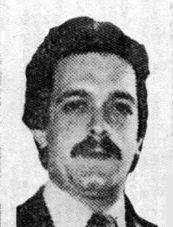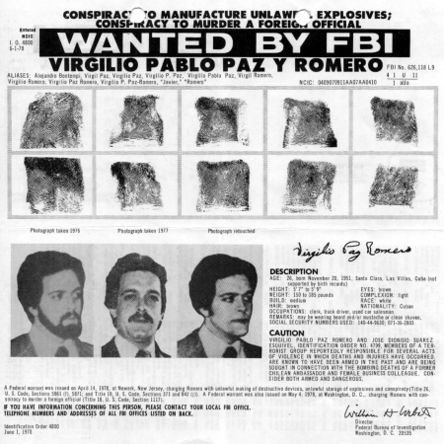Difference between revisions of "Virgilio Paz Romero"
(Stub) |
(wanted by fbi) |
||
| (6 intermediate revisions by the same user not shown) | |||
| Line 1: | Line 1: | ||
{{person | {{person | ||
| − | | | + | |wikipedia=https://en.wikipedia.org/wiki/Virgilio_Paz_Romero |
|constitutes=terrorist, assassin, spook | |constitutes=terrorist, assassin, spook | ||
| − | |birth_date=1952 | + | |birth_date=20 November 1952 |
| + | |image=Virgilio Paz Romero.jpg | ||
}} | }} | ||
| − | In July 1991, Paz Romero pleaded guilty in the conspiracy to assassinate [[Orlando Letelier]], and on September 13, 1991, he was sentenced to 12 years in prison. He was paroled after serving half of his sentence, and an immigration judge ordered him deported. | + | '''Virgilio Paz Romero''' (who has many aliases) worked for [[Operation 40]] as an [[assassin]]. He served 6 years in [[prison]] in the USA for killing [[Orlando Letelier]]. |
| + | |||
| + | ==Background== | ||
| + | Paz's family left Santa Clara, [[Cuba]] in the mid-[[1960s]] when he was 14.<ref name="The Los Angeles Times; July 21, 2002">{{cite news |last=Pape |first=Eric |date=July 21, 2002 |title=A Terrorist's Second Thoughts |url=http://articles.latimes.com/2002/jul/21/magazine/tm-47348 |newspaper=Los Angeles Times |location= |access-date=June 6, 2015}}</ref> In 1966 while his family was in [[Mexico City]] awaiting papers to emigrate to the United States, Paz's father died.<ref name="The Los Angeles Times; July 21, 2002"/> He settled in a [[Cuban community]] in [[New Jersey]] with his mother.<ref name="The Los Angeles Times; July 21, 2002"/> When he was 16, Paz was the youngest member of the [[Cuban Nationalist Movement]].<ref name="The Los Angeles Times; July 21, 2002"/> | ||
| + | |||
| + | ==Career== | ||
| + | [[image:Romero wanted 1978.jpg|left|444px]] | ||
| + | He was an [[Operation 40]] member. He was sought for the [[Orlando Letelier]] [[assassination]]. | ||
| + | |||
| + | ===Letelier Assassination=== | ||
| + | In July 1991, Paz Romero pleaded guilty in the conspiracy to assassinate [[Orlando Letelier]], and on September 13, 1991, he was sentenced to 12 years in prison. He was paroled after serving half of his sentence, and an immigration judge ordered him deported.<ref name="Veiga">{{cite news |last=Veiga |first=Alex |date=August 2, 2001 |title=Cuban exile apologizes for '76 car bombing |url=http://news.google.com/newspapers?nid=1755&dat=20010802&id=L4IfAAAAIBAJ&sjid=qn8EAAAAIBAJ&pg=6608,1334420 |newspaper=Sarasota Herald-Tribune |location=Sarasota, Florida |accessdate=December 3, 2014}}</ref> Given that the United States did not have a deportation agreement with Cuba, he was placed into indefinite custody of the [[Immigration and Naturalization Service]].<ref name="Veiga"/> In July 2001 after the [[Supreme Court of the United States]] ruled that indefinite detentions were unconstitutional, [[Paul Huck]] of the [[United States District Court for the Southern District of Florida]] ordered Paz Romero released.<ref name="Veiga"/> | ||
{{SMWDocs}} | {{SMWDocs}} | ||
==References== | ==References== | ||
{{Reflist}} | {{Reflist}} | ||
| − | |||
Latest revision as of 19:23, 17 August 2017
(“terrorist”, assassin, spook) | |
|---|---|
 | |
| Born | 20 November 1952 |
| Member of | Operation 40 |
Virgilio Paz Romero (who has many aliases) worked for Operation 40 as an assassin. He served 6 years in prison in the USA for killing Orlando Letelier.
Background
Paz's family left Santa Clara, Cuba in the mid-1960s when he was 14.[1] In 1966 while his family was in Mexico City awaiting papers to emigrate to the United States, Paz's father died.[1] He settled in a Cuban community in New Jersey with his mother.[1] When he was 16, Paz was the youngest member of the Cuban Nationalist Movement.[1]
Career
He was an Operation 40 member. He was sought for the Orlando Letelier assassination.
Letelier Assassination
In July 1991, Paz Romero pleaded guilty in the conspiracy to assassinate Orlando Letelier, and on September 13, 1991, he was sentenced to 12 years in prison. He was paroled after serving half of his sentence, and an immigration judge ordered him deported.[2] Given that the United States did not have a deportation agreement with Cuba, he was placed into indefinite custody of the Immigration and Naturalization Service.[2] In July 2001 after the Supreme Court of the United States ruled that indefinite detentions were unconstitutional, Paul Huck of the United States District Court for the Southern District of Florida ordered Paz Romero released.[2]
